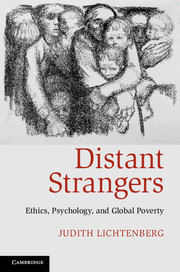Book contents
- Frontmatter
- Dedication
- Contents
- Preface
- Chapter 1 Introduction
- Chapter 2 Entanglements and the claims of mere humanity
- Chapter 3 Duties and rights, charity and justice
- Chapter 4 “Negative” and “positive” duties
- Chapter 5 Oughts and cans
- Chapter 6 Why people do what others do – and why that’s not so bad
- Chapter 7 Whose poor?/who’s poor?: deprivation within and across borders
- Chapter 8 Hopefully helping: the perils of giving
- Chapter 9 On motives and morality
- Chapter 10 Conclusion: morality for mere mortals
- Works cited
- Index
Chapter 9 - On motives and morality
Published online by Cambridge University Press: 05 June 2014
- Frontmatter
- Dedication
- Contents
- Preface
- Chapter 1 Introduction
- Chapter 2 Entanglements and the claims of mere humanity
- Chapter 3 Duties and rights, charity and justice
- Chapter 4 “Negative” and “positive” duties
- Chapter 5 Oughts and cans
- Chapter 6 Why people do what others do – and why that’s not so bad
- Chapter 7 Whose poor?/who’s poor?: deprivation within and across borders
- Chapter 8 Hopefully helping: the perils of giving
- Chapter 9 On motives and morality
- Chapter 10 Conclusion: morality for mere mortals
- Works cited
- Index
Summary
Alleviating global poverty is a morally pressing concern. I have been more or less taking that proposition for granted, and have focused my energies on showing that, although it is not only unrealistic but also unreasonable to expect ordinary human beings to make large sacrifices for the well-being of strangers (much less to insist that they are duty-bound to do so), we might nevertheless effect changes in their behavior that would reduce poverty without demanding too much of them.
To some this strategy will seem misguided. They believe the moral value of acting to benefit others – as by reducing their suffering – depends partly or wholly on the motive or reason from which a person acts. If so, advocating changes in behavior that altogether bypass what we typically think of as “moral” motives or reasons misses something crucial. The arguments of this book raise other questions as well about the nature of human motivation and its role in moral argument. How important is it that people act from moral rather than self-interested motives? To what extent can we count on such motives? I attempt to answer some of these questions in this chapter.
- Type
- Chapter
- Information
- Distant StrangersEthics, Psychology, and Global Poverty, pp. 206 - 234Publisher: Cambridge University PressPrint publication year: 2013



